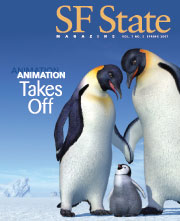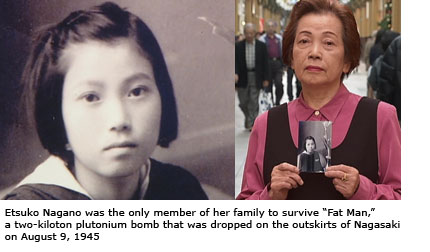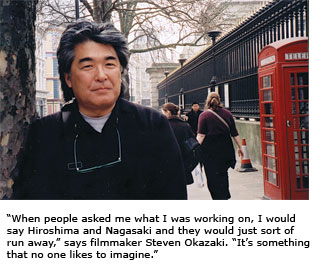 |  | |||

Remembering a Painful Past When Academy Award-winning filmmaker Steven Okazaki (B.A., '76) was making "White Light/Black Rain," a documentary on Hiroshima and Nagasaki that airs on HBO in August, he worried that no one would want to watch, that no one would care anymore. The 50th anniversary of the nuclear bombs had long passed and the images were so disturbing that even the filmmaker -- who had seen them many times already -- wept in the editing room. But Okazaki's 86-minute account of the nuclear attacks of August 6 and 9, 1945 -- told in the words of 14 survivors -- was well-received at Sundance, where it premiered in January. The film riveted high school students -- whom Okazaki feared would be "bored or freaked out" -- at a special screening in Salt Lake City. "The great thing is that it's a new generation of people who are paying attention to this and caring about this," he says. Cinema Professor Jameson Goldner remembers Okazaki as "one of the cleverest writers and directors we had." Although the filmmaker would become known for his dark subject matter, Goldner recalls his wit and humor, which would much later find outlets in "The Fair," a look at the 28 varieties of food-on-a-stick at the Minnesota State Fair, and the romantic comedy "Living on Tokyo Time," Okazaki's only feature. In "White Light/Black Rain," Okazaki returns to well-trod ground -- U.S.-Japan relations during World War II. His "Days of Waiting," the story of a Caucasian woman interned in 1942, won an Oscar for Short Subject in 1990. Academy Award nominations went to 1985's "Unfinished Business," about three men who refused internment, and 2005's "The Mushroom Club," about Hiroshima survivors. After "White Light/Black Rain," Okazaki is ready for a lighter project. Given his track record, it won't be easy. "I'm always searching for a way to do something lighter, but whenever I pitch things, I always hear, 'No, that's too uplifting,'" Okazaki says, laughing. | ||||









 The grandson of Japanese immigrants, Okazaki came to filmmaking by happenstance. He applied to SF State as an art major, only to learn the program was full. "I just ran and got the school catalogue and started going down the list of majors and stopped at film. And in 10 seconds, I had this epiphany," Okazaki recalls. "I was very shy, and I thought film would be good for me, because it would force me to deal with life."
The grandson of Japanese immigrants, Okazaki came to filmmaking by happenstance. He applied to SF State as an art major, only to learn the program was full. "I just ran and got the school catalogue and started going down the list of majors and stopped at film. And in 10 seconds, I had this epiphany," Okazaki recalls. "I was very shy, and I thought film would be good for me, because it would force me to deal with life."